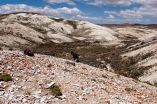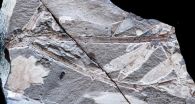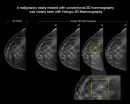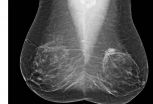INFORMATION:
The National Science Foundation partially supported this work.
Turn back the molecular clock, say Argentina's plant fossils
2014-12-02
(Press-News.org) Molecular clocks -- based on changes in genetic material -- indicate much younger ages for a wide variety of plants found as fossils in southern Argentina than do the solid, geologic dates of those fossils, according to geoscientists who surveyed recent paleobotanical discoveries in Patagonia.
The finding suggests serious biases in molecular clocks, which are heavily used to date many kinds of living things. It also directly refutes a widely-held idea about how most Southern Hemisphere plant and animal groups attained their current distributions.
Geologists date fossils by radioisotopic analysis, which can produce absolute ages with uncertainties less than 0.05 percent. Molecular clocks apply rates of molecular change and fossil 'calibrations' to the tree of life to construct a 'timetree' that estimates when evolutionary events occurred. Substitution rates come from DNA found in multiple genes, and known, dated fossils provide the calibration anchor points. Even though the clock method's stated errors are much larger than for geologic dating, it offers the hugely appealing advantage of dating the large proportion of living organisms that have very limited, or no, fossil record.
"Paleontology and molecular clocks have a long, uneasy relationship," said Peter Wilf, a paleobotanist and professor of geoscience, Penn State. "Paleontologists want molecular clocks to work. However, for years we have seen molecular dates, mostly for very deep evolutionary events, that are much older than the corresponding fossils. This situation has been a frustrating Catch-22 because if the clocks are wrong, no fossils exist that could demonstrate they are wrong. Here, we looked at many new plant fossils from the extremely productive region of Patagonia, and we found the opposite, that the fossils are much older than the clock dates. In this case, we can definitely say that the clocks are wrong. The fossils prove it."
Wilf, Ignacio Escapa, National Scientific and Technical Research Council, Egidio Feruglio Paleontology Museum (MEF), Trelew, Argentina, and many others have worked on Patagonian paleobotany together based at Penn State, MEF, and Cornell University for more than a decade.
We are dealing with one of the most recent controversies in biological sciences," said Escapa. "Is it possible to determinate the tempo of evolution without an exhaustive analysis of the fossil record? The extremely diverse fossil record emerging from Patagonia seems to indicate that this is not currently possible."
Wilf and Escapa looked at 19 fossil plant lineages of ferns, cycads, conifers and flowering plants from Patagonia, Argentina and compared their ages to molecular clock studies that used other fossils as calibrations. They reported their results today (Dec. 2) online in New Phytologist. They found that most of the fossil dates are significantly older than those determined by the molecular clock data, unless a previous calibration was already very closely related to the target fossil. The work's further significance lies in the fact that all the fossils examined represent plants that lived on the supercontinent Gondwana, in its terminal stage.
"We targeted our study towards one of the greatest debates in biology: what explains the disjunct distributions of so many plant and animal groups on different southern land masses separated by vast oceans?" said Wilf. "These land masses were once joined in Gondwana, and one famous school of thought, known as vicariance biogeography, holds that the modern distributions mostly result from the subsequent separations of the continents and the organisms that lived on them. On the other hand, molecular 'timetrees' increasingly place many evolutionary events after the final breakup of Gondwana, about 45 million years ago."
This explanation requires that many plant and animal groups evolved relatively recently, then somehow dispersed across the oceans. The vast accumulation of young molecular dates has convinced many researchers that this striking idea is correct.
"However, what we see in these fossils is that classic Southern Hemisphere plants, like the monkey puzzle trees that now inhabit South America and Australasia, lived on Gondwana long before it broke up." said Wilf. "Transoceanic travel is not required to explain their past and present distributions, and our results will reinvigorate the vicariance school. However, we caution that dispersal across oceans probably still played an important role, though diminished from what many have thought recently."
Gondwana was once composed of most of the land that is now in the Southern Hemisphere, plus India. At its last stage 45 million years ago, it still included Antarctica, South America, and Australia. The researchers' results show that living plant groups found as fossils across the Southern Hemisphere evolved while there were still land connections or shallow water between these continents. In many cases, no long distance, deep-water crossings were necessary to achieve the distributions of the fossils' living relatives.
Fossil plants from Patagonia are a superb resource for comparing geologic and molecular dates. Not only do fossils have accurate geological dates, but the taxonomic information on those fossils is well known because of their excellent preservation and completeness. There is now a large amount of new, high-quality information emerging from Patagonia that has not yet been assimilated into molecular dating studies, offering this rare opportunity to compare fossils and clocks for a relatively large number of plant groups.
The researchers are not certain why there is strong directional bias in these molecular clock dates. They suggest that some molecular clock studies omitted known fossils, which would have made the dates older. They also suggest that the conventions for placing fossils on the tree of life as calibrations are too conservative and seem to bias molecular estimates significantly toward younger dates.
The inaccuracy of the molecular clocks in this study raises new doubts about the accuracy of clock dates for many other organisms, from animals to human pathogens. The work bolsters the importance of continuing to find new fossils of important plant and animal groups from the many undersampled regions of the world. However, even though the dialogue between paleontologists and molecular biologists is often difficult, the researchers agree that it must continue so that a broader understanding can emerge.
"Discovery and description of new and exciting fossils, together with real interdisciplinary efforts, may be the single best opportunity to develop a clear consensus about this important issue in the evolution of life," said Escapa.
ELSE PRESS RELEASES FROM THIS DATE:
Revealed: How bacteria drill into our cells and kill them
2014-12-02
A team of scientists has revealed how certain harmful bacteria drill into our cells to kill them. Their study shows how bacterial 'nanodrills' assemble themselves on the outer surfaces of our cells, and includes the first movie of how they then punch holes in the cells' outer membranes. The research, published today in the journal eLife, supports the development of new drugs that target this mechanism, which is implicated in serious diseases. The team brings together researchers from UCL, Birkbeck, University of London, the University of Leicester, and Monash University ...
Study finds insects play important role in dealing with garbage on NYC streets
2014-12-02
In the city that never sleeps, it's easy to overlook the insects underfoot. But that doesn't mean they're not working hard. A new study from North Carolina State University shows that insects and other arthropods play a significant role in disposing of garbage on the streets of Manhattan.
"We calculate that the arthropods on medians down the Broadway/West St. corridor alone could consume more than 2,100 pounds of discarded junk food, the equivalent of 60,000 hot dogs, every year - assuming they take a break in the winter," says Dr. Elsa Youngsteadt, a research associate ...
If you are having a severe allergic reaction, you need epinephrine first and fast
2014-12-02
ARLINGTON HEIGHTS, Ill. (December 2, 2014) - If you are one of the millions of Americans who experiences a severe allergic reaction to food, latex or an insect sting, you should know the first line of defense in combating the reaction is epinephrine. Unfortunately, not all medical personnel know how important epinephrine is in bringing an allergic reaction under control.
According to new guidelines published in the Annals of Allergy, Asthma and Immunology, the scientific publication of the American College of Allergy, Asthma and Immunology (ACAAI), the fast administration ...
Alcohol abuse linked to newly identified gene network
2014-12-02
AUSTIN, Texas -- Researchers at The University of Texas at Austin have identified a network of genes that appear to work together in determining alcohol dependence. The findings, which could lead to future treatments and therapies for alcoholics and possibly help doctors screen for alcoholism, are being published this week in the journal Molecular Psychiatry.
By comparing patterns of genetic code from the brain tissue of alcoholics and nonalcoholics, the researchers discovered a particular set of genes co-expressed together in the individuals who had consumed the most ...
Even mild coronary artery disease puts diabetic patients at risk
2014-12-02
CHICAGO - According to a new long-term study, diabetic patients with even mild coronary artery disease face the same relative risk for a heart attack or other major adverse heart events as diabetics with serious single-vessel obstructive disease. Results of the study were presented today at the annual meeting of the Radiological Society of North America (RSNA).
Researchers at the University of British Columbia and St. Paul's Hospital in Vancouver analyzed data from the Coronary CT Angiography Evaluation For Clinical Outcomes: An International Multicenter (CONFIRM) Registry, ...
3-D mammography improves cancer detection in dense breasts
2014-12-02
CHICAGO - A major new study being presented at the annual meeting of the Radiological Society of North America (RSNA) has found that digital breast tomosynthesis, also known as 3-D mammography, has the potential to significantly increase the cancer detection rate in mammography screening of women with dense breasts.
Breasts are considered dense if they have a lot of fibrous or glandular tissue but not much fatty tissue. Research has shown that dense breasts are more likely to develop cancer, a problem compounded by the fact that cancer in dense breasts can be difficult ...
Risk-based screening misses breast cancers in women in their forties
2014-12-02
CHICAGO - A study of breast cancers detected with screening mammography found that strong family history and dense breast tissue were commonly absent in women between the ages of 40 and 49 diagnosed with breast cancer. Results of the study were presented today at the annual meeting of the Radiological Society of North America (RSNA).
"Screening recommendations for this age group continue to be debated," said Bonnie N. Joe, M.D., Ph.D., associate professor in residence and chief of women's imaging at University of California, San Francisco (UCSF). "Recent publications ...
Patients take control of their medical exam records
2014-12-02
CHICAGO - Patients value direct, independent access to their medical exams, according to a new study presented at the annual meeting of the Radiological Society of North America (RSNA).
Fragmentation of health information among physicians, healthcare institutions or practices, and inefficient exchange of test results can decrease quality of care and contribute to high medical costs. Improving communications and giving patients more control over their care are critical goals of health IT initiatives.
"Easy and timely electronic access to an online unified source of ...
Perceptions, referrals by medical providers affect mental-health treatment disparities
2014-12-02
Disparities in mental-health treatment are known to be associated with patients' racial and ethnic backgrounds. Now, a large study by researchers with UC Davis has found one possible reason for those disparities: Some racial and ethnic minorities are less likely to be assessed and referred for treatment by their medical providers.
The study of more than 9,000 diverse individuals, including Latinos, African-Americans, Asian-Americans and non-Hispanic whites, found that patients of different racial and ethnic backgrounds reported experiencing differing treatment approaches ...
Antacids linked to better survival in head and neck cancer
2014-12-02
ANN ARBOR, Mich. -- Patients with head and neck cancer who used antacid medicines to control acid reflux had better overall survival, according to a new study from the University of Michigan Comprehensive Cancer Center.
Reflux can be a common side effect of chemotherapy or radiation treatment for head and neck cancer. Doctors at the University of Michigan frequently prescribe two types of antacids - proton pump inhibitors or histamine 2 blockers - to help treat this side effect.
The researchers looked at 596 patients who were treated for head and neck cancer. More than ...




